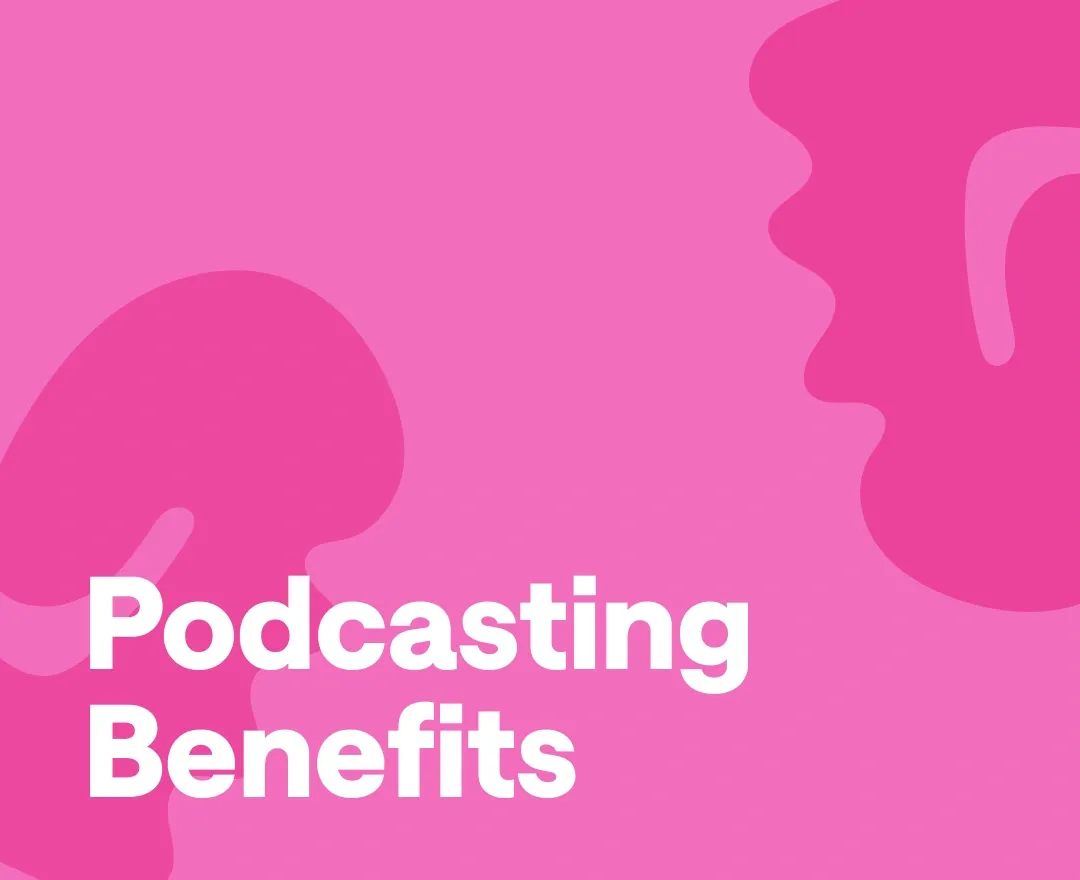Podcasting has become a popular channel for bringing businesses closer to their customers.
For listeners, podcasting provides a convenient way to access high-quality, up-to-date content from expert sources. Businesses can leverage that to build a personal connection with their audience, establish strong customer relationships, and enhance credibility for business success.
There are 464.7 million podcast listeners worldwide. That means podcasting also poses a great opportunity to tap into new audiences.
As a business, why do you need to start podcasting now? Here are six podcasting benefits for you:
1) Increases Brand Visibility
Podcasts are a great marketing channel. One of the best podcasting benefits is increased brand visibility. You can reach more podcast listeners on popular streaming platforms with content that resonates with them. You can turn these podcast listeners into your paying clients or customers, too.
Delivering high-quality content is the key to building a devoted fan base through podcasting. By offering valuable audio content regularly, including video podcasts, you'll cultivate a loyal following that will keep returning for more.
Remember to register your podcast on all on-demand listening platforms, such as Apple Podcasts, Spotify, and others. You can also submit your podcast to YouTube to increase the chances of new customers finding you.
You can also link your website in your podcast description to increase your visibility in search engines. This can drive more traffic to your website, which can signal to search engines and increase your domain authority. Also, including relevant keywords in your podcast episode descriptions can help boost SEO and make your podcast more visible in search results.
To further maximize your SEO efforts, you can create keyword-driven blog posts related to your podcast episode, using relevant keywords in the titles, headings, and body text. Also, include keywords in the meta description and alt tags for further content optimization. We’ll talk more about repurposing content later.
Source
Pat Flynn is an example of how you can use podcasting to increase your brand visibility. His "Smart Passive Income" podcast focuses on online business strategies, increasing income, and entrepreneurship. He boasts a whopping 10 million downloads for that podcast.
With his increased visibility in the podcast sphere, Pat managed to secure partnerships, speaking engagements, and increase book sales in the US, Australia, Canada, among other countries.
2) Establishes Thought Leadership
Hosting your own podcast can be a great way to establish yourself as an expert in your field. You can build credibility and become the go-to expert in your niche by offering a platform to share industry knowledge, analyze current trends, and demonstrate expertise through a podcast feed.
As you become known for your unique insights and industry expertise, you'll naturally attract new leads and potential clients interested in your services. This is a great podcast benefit, especially in B2B marketing where you need to demonstrate your expertise to a sophisticated audience for them to consider your solution.
We can again cite Pat Flynn as an example of a brand that used podcasting to establish his authority as an entrepreneur. In fact, it was this authority that helped boost his visibility in the podcast sphere and beyond, as we’ve already seen earlier.
Buffer is also an excellent example of a business that used podcasting to establish thought leadership. Its podcast "The Science of Social Media” focuses on social media marketing.
Source
By consistently delivering high-quality content, "The Science of Social Media" has become a go-to resource for marketers and professionals in the social media industry. The long term benefits are clear. Buffer is also now seen as a brand authority among social media marketers.
3) Builds Relationships
Here’s another one of the most significant podcasting benefits for businesses: podcasting helps in building relationships. We’ve all heard how relationships are key in entrepreneurship. Strong relationships can lead to repeat purchases, partnerships, and referrals, which will, ultimately, make your business grow.
In podcasting, you won’t just build relationships with your podcast listeners. You get to network with industry experts and other businesses as well. This can happen when you invite people to speak about a relevant topic during one of your episodes, for example, or when you collaborate with a business for a possible sponsorship.
Guy Raz’s “How I Built This” podcast has given him the opportunity to interact, not just with successful entrepreneurs but also with his listeners. As he built one relationship after the other, he managed to boost sales of his children’s books like “The How and Wow of the Human Body” and other publications, including one of the same name as his podcast.
Source
Whether it’s a podcast or a clothing business you’re running, hosting a podcast can give you the same results. Podcasting is an excellent platform for networking. With podcasting, even the people you invite as speakers can build relationships with potential customers–your podcast listeners—and grow their respective businesses.
4) Helps Generate Leads
You can also use your podcast to build your email list for leads. The more leads, the better for you. After all, you can convert them into paying customers.
One way to do this is to directly inform your listeners they’ll receive updates about a new episode if they sign up to your mailing list. Another option is to provide a bonus for signing up in the form of a lead magnet. Lead magnets can include e-books, checklists, templates, or exclusive content related to your podcast episodes. Promote these lead magnets during your podcast and provide a landing page where listeners can subscribe to your mailing list.
Copypress, a digital marketing agency, uses these two strategies to generate leads.
Each episode of its podcast "The Content Marketing Podcast” includes specific CTAs that encourage listeners to visit the agency's website for additional resources. These resources include free e-books, templates, or webinars related to content marketing.
Source
Also, the podcast promotes its email newsletter during episodes, encouraging listeners to sign up for exclusive content and updates.
5) Enhances Content Marketing Efforts through Repurposed Content
You can also enhance your content marketing strategies with podcasting.
By transforming your podcast episodes into a blog post, social media content, and YouTube videos, you can reach more people and get the most out of your content. In other words, with content repurposing, you can make a few ideas go a long way.
The easiest way to repurpose podcast material is to turn it into written content by transcribing the episodes.
You can expand on the topic of your podcast in a way that you can't with an audio format. For example, you can provide links to additional resources or add photos to illustrate your point. We’ve already mentioned how you should add relevant keywords in the titles, headings, and body text for SEO. Just make sure you use the best website for SEO hosting to ensure your valuable content loads quickly.
Alternatively, if you already have a content platform such as a blog, YouTube channel, or social media profile, you can repurpose the content from these channels into podcast material.
The “TED Radio Hour” podcast by media organization NPR, for instance, is actually repurposed content from TED Talks.
Source
Content repurposing is a great technique to improve your content marketing strategy since it saves you time and money. It also allows you to tap into potential customers and engage that audience who prefers to consume content on other platforms.
6) Allows for Monetization Opportunities
Advertisers increasingly turn to podcasts to reach their target audiences, as they offer a more intimate and engaging experience than traditional media. This allows for one of the great podcasting benefits you shouldn’t miss: monetization opportunities. With monetization, you can generate an additional revenue stream for your business.
You can monetize your podcast in several ways.
Sponsored content and ads won’t just help you earn additional income. They can also help establish your brand authority if you partner with the right businesses. By right businesses I mean these should be businesses that offer value to your podcast listeners.
The New York Times’ "The Daily” is an example of a podcast that features sponsorships and advertisements within its podcast episodes. These ads are typically placed at the beginning or middle of the episode and are read by the host or a designated spokesperson.
For example, this specific episode was created in collaboration with Audum.
Source
Alternatively, you can explore affiliate marketing, or promoting products or services from other platforms and earning a commission for each sale made through your unique referral link. Just make sure the product you choose to promote aligns with your podcast values and, again, with your audience’s preferences.
You can also earn if you charge guests a fee to appear in your podcast. Note, however, that there is a debate over whether or not this practice actually puts into question the integrity of the podcast.
The point is podcasting offers monetization opportunities and gives entrepreneurs the chance to boost their business income further. Use them to your advantage.
Why would a company want to use podcasts?
There are several benefits of podcasting for business:
1) Audience Engagement: Podcasts offer a unique opportunity to engage with audiences in a more personal and authentic way, allowing companies to connect on a deeper level.
2) Diversified Marketing: They add diversity to a company's marketing strategy, reaching new and broader demographics beyond traditional methods.
3) Educational Platform: Podcasts serve as a valuable educational platform, providing insights, tips, and information to both existing and potential customers.
4) Networking: Podcasts open doors for networking and collaboration with industry experts, partners, and influencers.
5) Community Building: Podcasts foster a sense of community around a brand, cultivating a dedicated and engaged audience.
6) Storytelling: They allow companies to tell compelling stories, humanizing their brand and forging emotional connections with listeners.









